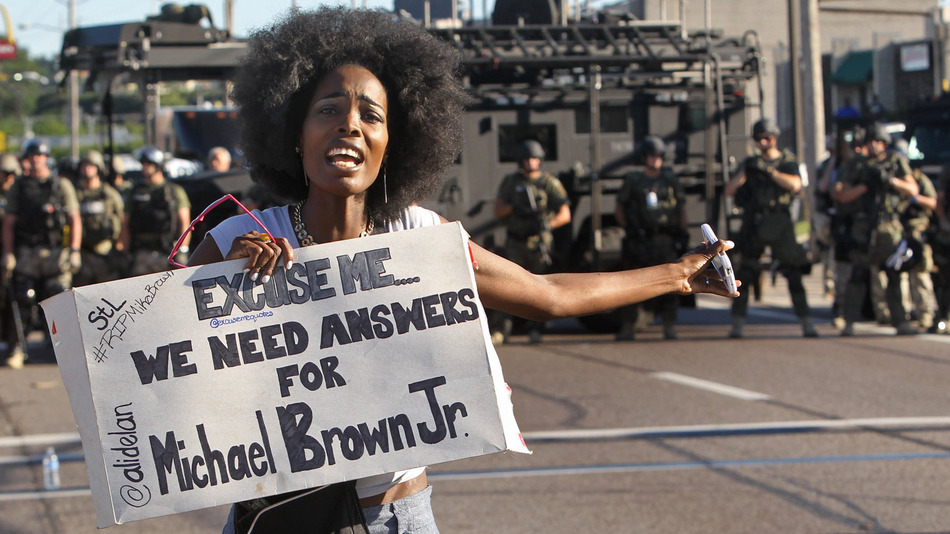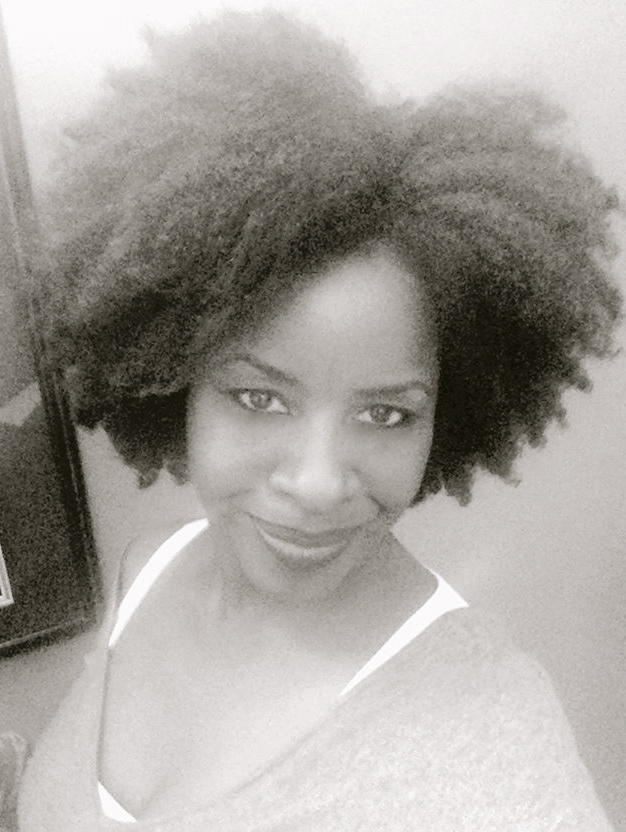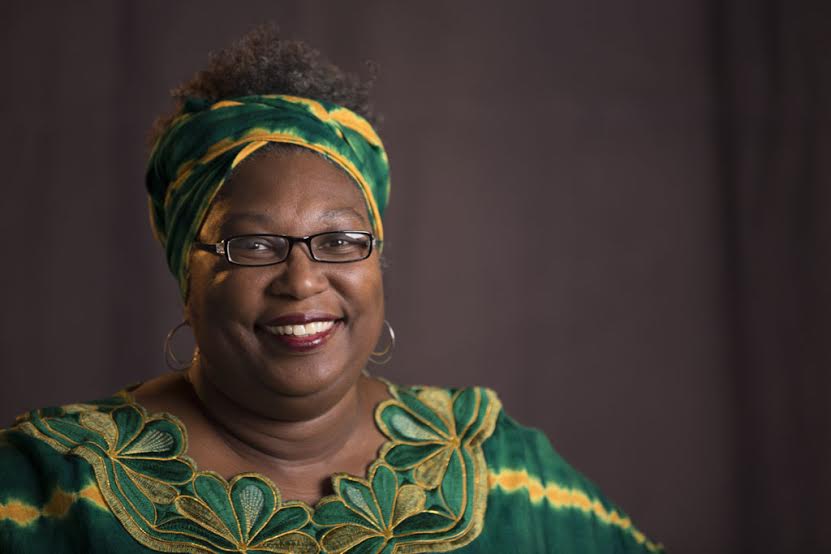#FergusonFridays: Not all of the Black freedom fighters are men: An Interview with Black Women on the Front line in Ferguson
By Kristin Braswell
As we marched from West Florissant to the Ferguson Police Department on that sweltering day in August, a bevy of voices carried through the air like a canon with a very specific target. Two young women armed with a megaphone, climbed on top of a cement wall above the crowd. “If Mike don’t get it, shut it down! If we don’t get it, shut it down!” they screamed. The crowd soon echoed the chant. In front of us, members of the Ferguson Police Department stood in a row, their faces expressionless; their gazes everywhere but nowhere. Regardless, the chants got louder. One man who joined the women above stepped down, chuckled and said, “I guess she got this.” And he was right. She did.
Since the moment Michael Brown was murdered on August 9, women in Ferguson have played a critical role in mobilizing their communities to convict officer Darren Wilson. Like the women of the Civil Rights movement, their strategies, passion and relentless pursuit for justice had not stopped. In fact, it is only getting stronger and more focused, as seen through the recent development of Millennial Activists United. Run by a majority of women, the group remains at the forefront of protests outside of the Ferguson Police Department, city council meetings and Twitter updates. They are recording a part of American history and fighting against a system that has often overlooked young people and Black women in particular. They feed, they clothe, they organize, and they rally. Because of them, there is a tangible movement occurring in Ferguson, one that may one day make the cover of Time magazine too late or never at all. But still, they fight. This is a movement of young people willing to risk their jobs, their degrees and even their lives in the name of freedom. Here are some voices of the women who have been on the ground since day one.
TFW: Who are the members of Millennial Activists and how did the idea to form the group come about?
Zakiya Jemmott: The members of Millennial Activists United (or MAU) are Brittany Ferrell, Ashley Yates, Zakiya Jemmott, Larry Fellows III, and Alexis Templeton. We are a gifted group of 20 and 30 something year old activists who were brought together by Twitter. We knew that we were passionate about bringing light to the injustices of police brutality in our communities and we dedicated ourselves to sustaining the movement. What began as making sandwiches for protesters and marching every night turned into us becoming street medics after being tear-gassed and shot at. After working together for weeks we realized we needed a name. Today we operate as Millennial Activists United, a youth-led grassroots organization that focuses on educating and empowering our communities.
TFW: What have you learned as women about the way you are perceived in the movement and how do you hope to empower other women?
Brittany Ferrell: I have never experienced such blatant sexism. I’ve always known for it to exists and I’m aware that at some point have been a victim of it, whether my socially conditioned mind had noticed it or not. But this movement has really put sexism directly in front of me, everyday, and since has built an intolerance within me. As women are the majority in the movement here in St. Louis, it puzzles me as to why we have to make sure we are heard and seen for the work we are doing, rather than just pretty faces. I’ve had to check so many brothers for coming at me as if I’m out here to look pretty and waiting for them to hit on me. One night while out at Ferguson Police Department, a place we frequent at night to ensure things are running smoothing, I was walking back to the car and this older man yelled at me “Ay, you, ay, come here. Let me touch your hair. Let me touch your hair.” Now, mind you, he was suppose to be a “protester” yet he is more worried about me and my hair rather than his purpose for being there at that time. That same night I had a brother ask me if my clothing I had on were my “activist clothing” because I looked way to beautiful to be out there at night.
Johnetta Elzie: While being a part of the protests from start to finish I saw and felt the strength of women. I witnessed the fearless spirits of the people, but there was something special happening. For the first time I had seen a large group of women standing side by side, crying out in anger, sorrow, and pain. Our hurt and pain caused an organic bond to start forming. To go from the streets protesting with women being on the frontline, to inside closed meetings where women are the minority discussing what has happened in Ferguson, I continue to tell the truth of what happened in Ferguson from a female’s perspective. By being involved in private conversations, hopefully it inspires other women who stood on the frontlines to do the same
Brittney Ferrell: Being that MAU is a majority woman organization, we are committed to defending and taking up for each other, and that is what we do. In both incidents we had each other, and soon everyone will know when they see us, we are not there to showcase our pretty faces, so if you aren’t careful with your sexism you will be called on it.
I hope that we as a majority woman organization can empower women to not be afraid to confront all oppression, sexism included. This is a fight way greater than we can imagine but we are fully capable of fight to the end and being heard.
Ashley Yates: The perception of women in the movement is definitely positive. People recognize that women are instrumental in leading this movement and propelled it forward from all fronts: the ground, social media and organizing. However, when it comes to the platforms for the movement, the women have definitely been left behind in a sense. MAU plans on leading the way in carving out a space for women to not only be heard on a larger platform but also creating safe spaces in which the women of Ferguson and greater St Louis can cultivate conversation and generate concrete ways in which we can move forward together in unity: with ourselves and the men of this movement.
Zakiya Jemmott: Gender inclusion is a major issue that we have all faced since our involvement. When we go out to protest or even speak at town hall meetings there is a lack of support from a majority of the men and we are treated as if we’re invisible and haven’t been the most vocal since the movement mobilized. We have reached out to our men and asked them to stand with us and not for us because this is our fight just as much as theirs. Personally I have been chastised by black men that claim they love black women and was even told that I’m only good for twerking by one of these men. He’s a well-known misogynist so I won’t hold that against all of our black men that have been supporting and fighting with us.
TFW: What has the media left out in regard to the important role that Black women have played in Ferguson?
Brittany: The media has left out that if it were not for Black Women, there would be no movement. We have seriously carried this to where it is now, not to say there are no men out here doing their thing because there are. What I am saying is that women have been here since day one, we are willing to lay our lives on the line to keep up the good fight without the support from anyone or any organization, hence why we built our own.
Zakiya: The media is excluding the fact that the police brutality and harassment in our communities impacts the women just as much as the men. They’re highlighting black male lives and pushing the black female lives lost to police violence to the side. I want for the media to understand that ALL black lives matter.
TFW: How have you had to adjust your lives (work schedules, school, etc) in order to commit to this movement?
Brittany: I am a mother and a senior nursing student. My life has been altered tremendously. There have been times when I’ve had my child out during the day to protest because my sitters didn’t support my involvement in the movement. I’ve had to bring her to meetings with me, with her homework and dinner because I know I wouldn’t make it home in time to cook. I’ve had to meet with my dean to explain to them my involvement in Ferguson and how insensitive I think the university is for not acknowledging the events in Ferguson when it is practically their backyard (University of Missouri St. Louis) and how it directly affects students that look like me! I work from home but I haven’t really been able to put that much work in because I’m so invested in the community. I’ve had a relationship crumble because my experiences have shifted my perspective on feminism and my attitude on resistance and they don’t approve. It’s crazy.
Ashley: (Ha.) Our lives have been on pause since Aug 9th. The formulation of MAU really happened organically, as we looked around and saw who was working day in and day out in Ferguson. As we began to have conversations with each other, we saw the absolute dedication each and every one of us have to making sure this horrific tragedy is transformed into a revolutionary transformation of the system as it stands. For some of us that meant delaying school, others it meant quitting jobs in order to commit fully to fighting for justice.
Zakiya: Personally I postponed my graduate school enrollment date to relocate to St. Louis for graduate school for the following semester. Now that we have founded MAU I want to make sure I’m available.
TFW: Take us back to some of the early moments of protesting after Mike Brown’s murder. How did you all mobilize then?
Brittany: We were out in Ferguson everyday with resistance, marching, and chanting. In between doing those things, we fed protesters that were out, one food round in the morning and one in the evening, to make sure everyone was fed. At night when the tanks, gas and bullets came out, we turned into either raging protesters or medics. Equipped with masks, Maalox and apple cider remedies and other things to treat tear gas exposure. We mobilized in the best ways we knew how early in the protests.
Ashley: Twitter was largely responsible for getting the word out about actions and movements in the first week. That was the way in which almost every one of us got the news that Mike Brown had been murdered and it’s importance in the early days cannot be stressed enough. The day I met Netta and Larry was Monday, Aug 11th. West Florissant and practically all of Ferguson was completely shut down and blocked off by police. Determined to get in and continue to tell our narrative, I followed their actions on Twitter, messaged them about their whereabouts and met up with them at a mutual friend’s house. I didn’t know any of the people that I now call my activist family before this. We didn’t have each other phone numbers, but Twitter made it so that we could connect in the midst of chaos and police attacks and form a community.
TFW: Ferguson has a long history of distrust for law enforcement. Did your opinion on the police force changer after the protests?
Brittany: I had the same views of Ferguson, and St. Louis, before the protests as I do now. The only difference is that now I know they have more equipment than I thought.
Ashley: Entirely. I never had a hatred for the police. Songs like “eff the police” would make me cringe, because of generalization and stereotypes. But what I realized after that first week is that the police have a culture that warrants and actually invites those generalizations. They are a force. Several of them told me on August 10th that they are a fraternity. That reality really hit home when I realized some of those same officers that were so civil during the daylight were pointing rifles at my head during the night and would not hesitate to shoot me upon command. It’s a system based on unwavering trust and support in each other, even when they are obviously wrong, And sadly, it’s that culture of unquestioned authority that pits them against the very communities they are supposed to be “serving”.
Zakiya: I grew up in Bedford-Stuyvesant, Brooklyn, New York. I’ve reiterated many times that Ferguson’s W. Florissant is comparable to my Nostrand Avenue. My first protest was in 1999, when Amadou Diallo was murdered by police. I haven’t seen any changes and have not changed my perception of police officers.
TFW: I’ve read you refer to your work as part of a “revolution.” Why is a youth led movement integral to this revolution?
Brittany: The youth led movement is an integral part of this revolution because we know that what has been done before will not work now. The dynamics are different. We have identified what is lacking and what is needed for us as a people to move forward in strength. We recognize that if Darren Wilson is not arrested for murdering Mike Brown the city will burn, and we have accepted that. We are unmoved and unafraid. Without us I feel this whole situation would have been swept under the rug by week 2.
Ashley: The youth knew something very early in that the older generation didn’t. We knew that the system had already failed even before they began to show their hand publicly. We knew that not only was the murder of Mike Brown unjustified, it was another example of how the systems in place made it acceptable to gun us down. We are the generation that was ignited by Trayvon Martin’s murder and placed our faith in a justice system that failed us in a very public and intentional manner. Most of us were raised by parents that inherited the fruits of labor from the Civil Rights movement. They were placated, in a sense, by the stories of a reality that no longer seemed an issue for them. So as we navigate a society where those realities of segregation and oppression are supposed to be far behind us, yet are more present than ever before in our lives, we say no more. We are the descendants of those who already fought for these freedoms and we will not let their sacrifices, blood, sweat and tears be swept away. We will cash in on the heavy price they already paid.
Johnetta: The youth leading this movement is important because it is our time. For so long the elders have told us our generation doesn’t fight for anything, or that we don’t care about what goes on in the world. We have proved them wrong. Consciousness has been raised, people are waking up to take a stand against injustice. Thankfully for this generation, instead of waiting for a letter in the mail from Malcolm X, we have social media to drive this movement and get the truth out to millions of people, live.
TFW: What do Millennial Activists hope to accomplish? How can people in STL and out of state get involved?
Ashley: MAU is dedicated to lifting up the community of Ferguson first and foremost. We are committed to complete and utter reform of the systems in place that are clearly designed against us. Political education, community policing, grassroots organizing and on the ground actions are the methods we believe are instrumental in achieving a radical reform that will make the world our children inherit better than the one we came into. People wanting to get involved with us can contact us via twitter @MillennialAU or email us at [email protected]
Zakiya: We encourage people to become active in their communities and register to vote. It’s apparent that the local legislators are pivotal in fundamental change in our communities and not just the national legislators. We want our young people to be educated on our political rights and human rights. There are workshops that we teach locally but still encourage anyone to lead discussions on past events and build strategies for the future.
TFW: Beyond the news reports and headlines, what do you want people to know about Ferguson?
Brittany: Ferguson was the catalyst to a movement that involves all Black and Brown people worldwide. We will never stop fighting for justice for US.
Ashley: I would like people to know that Ferguson is just like YOUR town. If people learn one thing from the happenings here, let it be that, if it happened here, it can happen anywhere. MillennialAU is fighting everyday to make sure that is not the case. Join with us and help us ensure that no other Black names are immortalized through a hashtag like #MikeBrown.
Johnetta: Ferguson is a small community, within St. Louis County. It is a normal neighborhood filled with small businesses, and some major chains too. Nothing like this has happened in Ferguson before. We are truly learning as we go.
__________________________________
 Kristin Braswell is a Brooklyn-based journalist and producer by way of Los Angeles. She has contributed to The Huffington Post, Essence, ABC News, NPR, and Ebony, and her writing portfolio includes travel features, film critiques and social analyses. She has also produced short films and commercials. She is especially passionate about education, race and gender equality, as well as the promotion of healthy living and relationships. Her aim is to use writing as a tool to get people to think and to desire positive changes for themselves and their world.
Kristin Braswell is a Brooklyn-based journalist and producer by way of Los Angeles. She has contributed to The Huffington Post, Essence, ABC News, NPR, and Ebony, and her writing portfolio includes travel features, film critiques and social analyses. She has also produced short films and commercials. She is especially passionate about education, race and gender equality, as well as the promotion of healthy living and relationships. Her aim is to use writing as a tool to get people to think and to desire positive changes for themselves and their world.




Pingback: the police are a fraternity | Male Traitor
Pingback: Sunday Links, 10/12/14 | Tutus And Tiny Hats